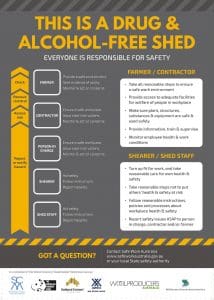 WOOL growers and contractors will be encouraged to prohibit workers from sheds found to be under the influence of drugs and alcohol under a new industry policy released today.
WOOL growers and contractors will be encouraged to prohibit workers from sheds found to be under the influence of drugs and alcohol under a new industry policy released today.
The employers will be encouraged to apply the template drug and alcohol policy developed by an industry group, including prohibiting the working of those under the influence of substances consumed elsewhere.
The shearing industry stakeholder group has developed resources, including a shearing shed poster, to communicate the expectations of all shed workers, to meet their safety obligations.
The comprehensive policy document also sets out industry procedures for dealing with drug and alcohol misuse in the shearing workplace.
The policy states that random drug and alcohol screening is an option for employers and supervisors.
“If an employer/supervisor adopts a particular approach to drug screening, all persons at the workplace must be notified of this requirement at the time that approach is adopted or prior to commencing employment (whichever is the later).
“Screening may be random, in response to a reasonable suspicion that a worker has consumed drugs or alcohol, or following a workplace safety incident or near miss,” the policy states.
“Failure to submit to a drug or alcohol screening without reasonable explanation in accordance with this policy, will be considered a positive test result.”
The policy and a wool shed poster are part of a new industry-wide initiative to improve shed safety by reminding growers, shearing contractors, shearers and shed staff of their responsibility to maintain drug and alcohol-free workplaces.
Wool shed safety is critically important
WoolProducers Australia chief executive officer Jo Hall said shed safety was a critically important issue.
“Australia is the world’s number one producer of premium quality wool and is the largest producer of all wools by value and volume.
“It is important that work practices reflect our status as the best.”
Ms Hall said wool growers had a responsibility to take all reasonable steps to ensure a safe work environment.
Shearing Contractors Association of Australia secretary Jason Letchford said contractors shared many of the responsibilities of growers and had a key role to play in ensuring shed workers understand what is expected of them.
“Shed workers must turn up fit for work, take reasonable steps to protect theirs and their fellow workers safety and adhere to workplace health and safety processes and policies.”
Mr Letchford said when it came to drug and alcohol misuse, the shearing industry was not alone in its challenges.
“The full extent of the presence of substance misuse in the shearing industry is not known, but nevertheless, this industry is encouraging anyone who is doing the wrong thing to clean up their act.”
The policy document and shed poster are partly the result of a conference the group hosted in Adelaide during May to discuss the issues surrounding drug and alcohol misuse in the industry.
At the conference, participants were given an opportunity to listen to experts in the area and discuss the issues that arise on the ground.
The shearing industry stakeholder group is now considering whether there is scope for looking at safety in the shearing industry more broadly.
The poster, sponsored by AWTA, will be distributed in Australian Wool Innovation’s Beyond the Bale publication, distributed to all levy-paying growers and is available for download here.
The shearing industry stakeholder group includes representatives of the National Farmers’ Federation, the Australian Workers’ Union, the Shearing Contractors Association of Australia, WoolProducers Australia, Australian Wool Exchange and the Western Australia Shearing Industry Association. The group is supported by the Australian Wool Testing Authority.
To download the policy document click here.
To download the shearing shed poster click here.

So they want to prohibit workers from sheds who are under the influence of drugs and alcohol. Is that why so many sheds look a bit wonky? I suppose that’s easier than trying to get the ‘workers’ off drugs and alcohol. Depletion of minerals and water is a workplace hazard for shearers, so they have a beer or more uselessly, spirits. Unfortunately the advertising assault by high-caffeine and sugared ‘energy’ drinks, drinks which harm human organs and worsen thirst has sidelined more suitable liquids, or eating fruits. The workplace policies mentioned by Jason Letchford are not the primary criteria. The primary criteria is stated in the OHS and WHS Acts (2011 as amended) and the OHS and WHS regulations. Workplace policy, unless an improvement on the individually best ‘reasonably practicable’ requirements of Acts and regulations, cannot be taken as acceptable per se. Often there are hurdles to overcome with individuals who have grown up operating in high risk shed environments and shearing practices. Modern sheds have shown me that poor design and the meeting of shed inspection requirements, proven in court to be required before workers attend a job, is quite difficult to organise, when contractors are involved with distant sheds and the ‘shed boss’ and cockie might be in various stages of ignorance, denial or reactivity, downtube equipment is not stored properly and drives are not tightened to timber properly nor fully maintained. My calls to SCAA to discuss and resolve these work health safety and environment matters have been unanswered in recent months.
Full names required in future for reader comments please Jaques, as per Sheep Central’s long-standing comments policy: https://www.sheepcentral.com/about-us/sheep-central-comment-policy/ Editor.